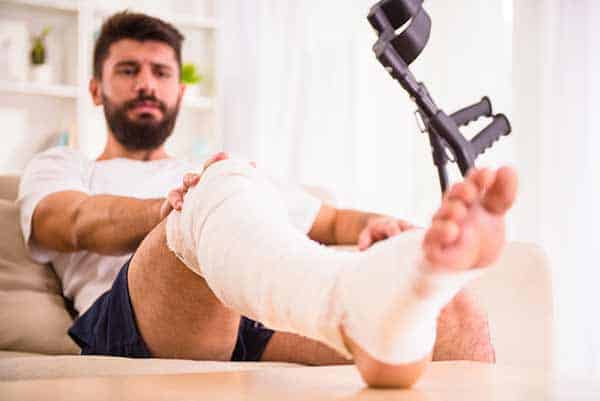Damages are the monetary compensation an injured party receives after settling or winning a personal injury lawsuit. A judge or jury will award monetary damages to an accident victim who proves financial, physical, and/or emotional losses related to their personal injury. Decatur personal injury attorneys at Marks Law Group will help you get the maximum compensation you need to cover your present and future medical bills, property damage, pain and suffering, funeral expenses in the event of wrongful death of a loved one, lost wages, and any other monetary and non-monetary damages.
Our experienced personal injury attorneys can speak with you about the kinds of damages in injury claims you may be able to pursue in your personal injury case and can help you determine the amount of financial compensation you should receive after a bodily injury caused by another person's negligence.
For legal help, please contact our Decatur personal injury law firm today by filling out our contact form or calling (678) 251-9309 today to schedule a free initial consultation.
What are the 3 Types of Damages Can I Recover in a Georgia Personal Injury Case?
A personal injury claim can arise from many situations. Personal injury cases can involve motor vehicle accidents, medical malpractice, defective equipment, dog bites, slip and fall accidents, dog bites, and many other situations. The following damages are typically available in many personal injury cases.
https://youtu.be/BIdAKmk6rnQ
Economic Damages in Georgia Personal Injury Cases
You may incur a ton of financial losses because of a bodily injury caused by another person or entity. Your financial losses are called economic damages. Economic damages in a personal injury claim may include:
-
Loss of income. Most accident victims miss time from work because of their injuries. When you file an injury claim, you can include any lost wages you suffered. Lost income includes wages, salaries, bonuses, commissions, benefits, and other forms of income. You must have proof of your lost income and proof of your income before the incident that caused your injuries. Your employer can provide a statement for your missed time from work and copies of your pay history.
-
Medical expenses. Depending on your injuries, the cost of medical care could be costly. You should the cost of all reasonable and necessary medical treatment you incurred in your personal injury claim. Your medical records will have some of the documentation required to prove your medical expenses. However, you should also preserve all medical receipts for medical supplies or over-the-counter medications so that you receive reimbursement for all medical costs. Medical costs included in a personal injury claim include:
-
Surgery expenses;
-
Physicians’ bills;
-
Hospital and emergency room costs;
-
Ambulance expenses;
-
Physical therapy expenses and other types of therapy, such as vocational and occupational therapy;
-
Counseling and therapy for anxiety, depression, PTSD, and other psychological conditions;
-
Personal care or in-home care expenses; and
-
Medications, medical supplies, and costs of purchasing medical equipment.
-
Future economic damages. When you sustain a permanent physical impairment, such as an amputation, paralysis, or brain damage, you may recover future economic damages. If you can't work because of permanent disability, you may receive monetary compensation for future loss of income. If your physical impairment prevents you from earning the same income you received before the accident, you may receive financial compensation for a decrease in earning potential. Also, you may recover compensation for ongoing and future medical care and personal care.
-
Other monetary damages. Some accident victims incur other monetary damages because of a personal injury. Thus, you may include travel costs to and from doctor’s visits and help with household chores or childcare in your personal claim. If you must renovate your home or vehicle because of a physical impairment, you can include that expense in your injury claim. However, you must have proof of all expenses. So, you must keep copies of all expenses and invoices, as well as proof of payment and receipts.

Non-Economic Damages in Georgia Personal Injury Cases
Besides the financial expenses caused by your injury, you also experience mental trauma, emotional distress, physical pain, and other non-economic damages. You can also include these “pain and suffering” damages in your personal injury claim.
Non-economic damages include:
- Permanent impairments and disabilities;
- Disfigurement and scarring;
- Physical pain and suffering;
- Mental trauma;
- Emotional distress;
- Depression, PTSD, anxiety, and other psychological conditions;
- Loss of enjoyment of life; and
- Stress and inconvenience.
The amount of money you may receive for non-economic damages largely depends on many factors. For instance, the value of your pain and suffering damages will depend on the type of injury you sustained and the severity of your injury. Personal injuries that are catastrophic or those that cause permanent impairment typically increase the value of non-economic damages.
It's difficult to calculate pain and suffering damages. That's because there isn't a specific formula you can use. However, most personal injury lawyers, insurance companies, and juries use the multiplier method to calculate non-economic damages.
A number, usually between 1.5 and 5, is assigned to your injury claim based on the severity of your injuries and other factors. Insurance adjusters then multiply that number with the total of your economic damages to get the value of your non-economic damages.

Punitive Damages in Georgia Personal Injury Cases
Punitive damages are awarded in few personal injury cases. These damages are only awarded if the at-fault party was guilty of intentional misconduct or gross negligence. These damages are also known as compensatory damages because their intent is to compensate the injured party for any loss they suffered. In Georgia, there are both Constitutional limits and state laws that limit the amount of punitive awards. Georgia law caps most punitive damages at $250,000.
Should I Hire A Decatur Personal Injury Lawyer?
You may not need an attorney for a personal injury claim, but it's wise to speak with an experienced personal injury attorney as soon as possible. Insurance companies have one goal–to pay as little money as possible to accident victims. Thus, insurance companies are for-profit businesses.
Thus, paying personal injury claims isn't a priority. An insurance company wants to pay as little money as possible to settle your injury claim if the insurance company can't deny your injury claim.
Related Content: What does a Personal Injury Lawyer do?
If you answer questions or give a written statement to the insurance adjuster without consulting a personal injury lawyer, you may say something that would harm your case. Signing medical releases and accepting settlement offers before a personal injury lawyer reviews the documents is also unwise.
If you settle your claim, the settlement is final. A settlement agreement is a legal contract that can be enforced by a judge. If you discover additional damages or change your mind, you can't sue the at-fault parties because the settlement agreement released them from all known and “unknown” injury claims or damages.
Further, it's imperative to note that you have limited time to file a personal injury claim. Not filing your personal injury claim before the deadline in the statute of limitations expires could lose your right to hold the at-fault party responsible for your damages.
Contact Our Seasoned Decatur Personal Injury Lawyers Today for Legal Advice!
With a positive mindset, it’s possible to have a path to financial restitution after even the most catastrophic injury. At the very least, you can sue for financial damages that will cover the direct economic damages of your injury; and under certain circumstances, you could even sue for more abstract damages, such as loss of quality of life, or see the liable party punished for his or her negligent behavior.
To get the amount of compensation you deserve, however, you must work with a skilled personal injury lawyer. At Marks Law Group, we’re familiar with the intricacies of Georgia's personal injury law, and we're committed to the long-term well-being of our clients. To learn more about our legal services and receive a no-cost initial consultation, get in touch with us at (678) 251-9309 today!
